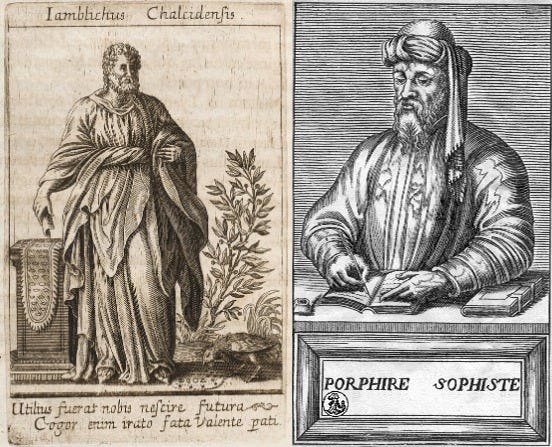THERE is a crucial difference between the manner in which Porphyry and Iamblichus - two of the main Neoplatonist thinkers active during the third and fourth centuries - interpret the relationship between the human soul, the natural world and the cosmos in general.
Porphyry, who wrote fascinating biographies of both Pythagoras and Plotinus, reversed Plato's cosmological hierarchy by rejecting the notion that souls descend to earth. This error began with Numenius of Apamea in the second century, with both Plotinus and Porphyry following his example by steadfastly refusing to accept that demonic forces are located within the soul rather than in the sensible realm. In response, Iamblichus railed against this dramatic overturning of Platonism by explaining in his De Mysteriis that such a
“doctrine spells the ruin of all holy ritual and theurgic communion between gods and men since it places the presence of superior beings outside this earth. For it amounts to saying that the divine is at a distance from the earth and cannot mingle with men and that this lower region is a desert, without gods.”
Furthermore, although Plato's own system rests upon the idea that the entire cosmos is ‘good’ the demonic principle is never relegated to the periphery of the universal hierarchy because of the inevitable consequences it would have in relation to free will and self-determination. As Gregory Shaw explains:
“Iamblichus, like Plato, placed the demonic within the embodied soul, the only chaos untamed by the Demiurge. Yet, in Iamblichus’s Platonism the purpose of this alienation was made clearer: while Plato’s Demiurge gave to each soul a spark of himself, Iamblichus understood this to mean that each soul had the responsibility to perform its own demiurgy, that is to say, its own theurgy. The task for every soul was to partake in divine mimesis by creating a cosmos out of the initial chaos of its embodiment. Therefore, the “demonic” condition of the embodied soul was a felix culpa without which the soul could not participate in cosmogenesis, including its own creation and salvation.”
Unlike Porphyry, Iamblichus knew perfectly well that if the material world is associated purely with evil and suffering - as the Gnostics would have it - there is no chance of allowing humanity to participate in the theurgical rituals that allow the best of us to ascend the cosmological ladder towards the One. When the soul descends into the body, it remains mortal and immortal at the same time; a paradox which is absolutely fundamental in the overall quest to create order from material chaos and, by doing so, actively co-operate with Divine Will.





Never heard of Iamblichus - but very good. Reminds me of Chasid Kabalah